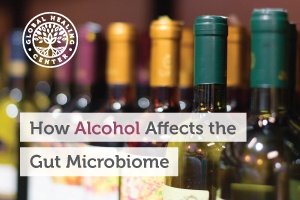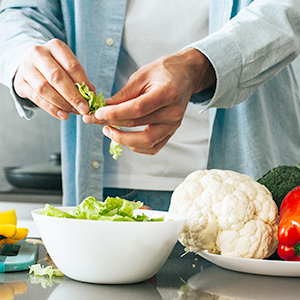
The National Institute on Alcohol Abuse and Alcoholism (NIAA) reports that alcohol consumption is a normal part of life for many people.[1] Although it’s difficult to consider alcohol consumption “healthy,” it does appear that drinking responsibly and in moderation is the situation for many who indulge. “At-risk” drinking, however, can cause concerns. The NIAA considers at-risk drinking to be more than four drinks per day or fourteen per week for men, and more than three drinks per day or seven per week for women.
How prevalent is this type of concern drinking? In 2013, 24.6% of adults reported that they engaged in binge drinking in the past month. Roughly 25% of people who exceed the NIAA limits have an Alcohol Use Disorder. In 2014, this amounted to 16.3 million adults in the U.S.
Heavy drinking can lead to an array of serious health issues. In this article, we will focus on one of the lesser known — dysbiosis — which is an imbalance in the gut microbiota.[2]
The gastrointestinal tract is home to bacteria and microbes that form an ecosystem known as the gut microbiota. This collection of bacteria is essential for digestion, the immune system, mental health, and more.[3] The microbes contain genes, this is known as the gut microbiome.[4]
The growth and maintenance of these bacteria can be influenced, positively or negatively, by several factors. A healthy diet of raw, organic, prebiotic-rich food encourages the gut microbiota to flourish. Conversely, an unhealthy diet, one that’s high in refined sugar and artificial ingredients, for example, has a detrimental effect and can cause an imbalance between good and bad bacteria. An unhealthy diet is just one possible cause of a gut imbalance. Other factors that may lead to an imbalance include:[5]
- Diet[6]
- Antibiotics
- Physical stress
- Age
- Pollution
- Alcohol
Let’s look at how alcohol affects the human microbiome.
Alcohol-Induced Changes on Gut Microbiota
Some of the bacteria that make up the gut microbiota are “good” and support good health; others are “bad.” We all have both good and potentially bad bacteria living inside of us. In fact, the digestive tract may contain up to 1000 different species of bacteria at any given time.
Most of the time, for most people, the good bacteria keep the harmful bacteria in check.[7] However, if that harmony and equilibrium are disrupted, bad bacteria can take hold and become a “problem.” Sometimes the concern might be inefficient digestion, sometimes it might be a more specific sickness.
Recent research suggests alcohol can influence the gut microbiota. Alcohol abuse, especially, can alter the delicate equilibrium and disrupt the intestinal environment.[8]
Not only does alcohol abuse alter the gut microbiota, it can cause gut permeability, also known as leaky gut syndrome.[9] Some researchers have hypothesized leaky gut syndrome can lead to bacterial translocation.[8]
“Bacterial translocation is the invasion of indigenous intestinal bacteria through the gut mucosa to normally sterile tissues and the internal organs.” [10] In other words, it’s when the bacteria in your gut escape to other parts of your body. This prompts a domino effect where one bad event is the catalyst for another. Alcohol consumption alters gut flora, leading to leaky gut syndrome, leading to bacterial translocation, leading to inflammatory changes in the liver and elsewhere.[11]
Translocation also allows for toxins from the gut to enter the bloodstream. Among the many concerns this causes, it exposes the liver to toxins and increases the chance of liver injury.
The Relationship Between the Liver and Intestinal Microbiota
Gut health is closely related to liver health as bacteria in the gut exert a level of control over various metabolic functions. There appears to be a symbiotic relationship between gut microbes, how they affect the microbiota, and the impact that has on overall health.[12]
A study published in May 2015 suggests that alcohol abuse changes the composition of gut microbiota.[13] Several studies consider the modulation of gut microbiota as a promising strategy to reduce alcohol-induced liver injury.[14]
Before looking at the best way to maintain a healthy gut microbiome, let’s briefly take a look at the other effects of alcohol on the human body.
Other Effects of Alcohol in the Human Body
Alcohol interferes with the brain’s communication pathways, affecting mood, behavior, and coordination, and can even disrupt the growth of brain cells.[15] Alcohol overuse is associated with Alzheimer’s disease and other memory-related disorders.[16]
Excessive alcohol consumption damages the heart and contributes to alcoholic cardiomyopathy and arrhythmia.[17] Alcohol can cause liver concerns, including fatty liver and cirrhosis.[18]
Alcohol takes a toll on the pancreas and the immune system and actually increases the risk of developing some types of cancer.[19] It alters hormone balance, which causes reproductive deficits in both sexes, has a negative impact on immune system function, and affects bone health.[20]
These are just some of the negative health effects associated with alcohol, but let’s get back to the main topic… how to protect the gut microbiome from damage.
How to Protect and Maintain the Gut Microbiome
The easiest way to protect the gut microbiome from alcohol is to simply abstain from consuming alcohol. Not everyone is in favor of being a teetotaller but there are more reasons to avoid alcohol than not. Not to mention that, for some, drinking can be a slippery slope that quickly becomes a bad habit and eventual addiction, complete with the accompanying health concerns. Who needs it?
In the interest of fair reporting, there are some opinions that, because it contains polyphenols that support probiotic activity, red wine “promotes” gut health.[21] In one study, red wine was found to increase Bifidobacterium and Prevotella. This may have beneficial effects on the gut microbiome by lowering plasma lipopolysaccharides, a type of endotoxin that triggers an immune response.[22]
Do follow a healthy lifestyle. Don’t consume alcohol in excess. Do eat plenty of green, leafy vegetables and whole, raw foods. If you don’t eat fermented foods, consider taking a good quality probiotic supplement to encourage a positive, balanced gut environment. The best probiotic supplements contain a blend of probiotic strains. Last year, we released Global Healing's Ultimate Probiotic, a premium probiotic supplement that contains 23 different probiotic strains. The feedback we’ve received from customers is incredible.
References (22)
- National Institute on Alcohol Abuse and Alcoholism. Alcohol Facts and Statistics.
- Mutlu EA1, Gillevet PM, Rangwala H, Sikaroodi M, Naqvi A, Engen PA, Kwasny M, Lau CK, Keshavarzian A. Colonic microbiome is altered in alcoholism. Am J Physiol Gastrointest Liver Physiol. 2012 May 1;302(9):G966-78. doi: 10.1152/ajpgi.00380.2011. Epub 2012 Jan 12.
- Phillip A. Engen; Stefan J. Green, Ph.D.; Robin M. Voigt, Ph.D.; Christopher B. Forsyth, Ph.D.; and Ali Keshavarzian, M.D. The Gastrointestinal Microbiome: Alcohol Effects on the Composition of Intestinal Microbiota.
- University of Utah Health Sciences. The Human Microbiome. Genetic Science Learning Center. 2016.
- Hawrelak JA, Myers SP. The causes of intestinal dysbiosis: a review. Altern Med Rev. 2004 Jun;9(2):180-97.
- Mutlu EA, Gillevet PM, Rangwala H, Sikaroodi M, Naqvi A, Engen PA, Kwasny M, Lau CK, Keshavarzian A. Colonic microbiome is altered in alcoholism. Am J Physiol Gastrointest Liver Physiol. 2012 May 1;302(9):G966-78. doi: 10.1152/ajpgi.00380.2011. Epub 2012 Jan 12.
- National Institutes of Health. NIH Human Microbiome Project defines normal bacterial makeup of the body. NIH. June 13, 2012.
- Medscape. Alcohol and Gut Microbiota.
- Bode C, Bode JC. Effect of alcohol consumption on the gut. Best Pract Res Clin Gastroenterol. 2003 Aug;17(4):575-92.
- Vaishnavi C. Translocation of gut flora and its role in sepsis. Indian J Med Microbiol. 2013 Oct-Dec;31(4):334-42. doi: 10.4103/0255-0857.118870.
- Vishnudutt Purohit,a,* J. Christian Bode,b Christiane Bode,b David A. Brenner,c Mashkoor A. Choudhry,d Frank Hamilton,e Y. James Kang,f Ali Keshavarzian,g Radhakrishna Rao,h R. Balfour Sartor,i Christine Swanson,j and Jerrold R. Turnerk. Alcohol, Intestinal Bacterial Growth, Intestinal Permeability to Endotoxin, and Medical Consequences. Alcohol. 2008 Aug; 42(5): 349–361.
- American Society for Microbiology. "Gut bacteria can control organ functions." ScienceDaily. ScienceDaily, 21 March 2011.
- Jasmohan S Bajaj MD, MS, Phillip B Hylemon PhD and Zobair Younossi MD, MPH. The Intestinal Microbiota and Liver Disease. Am J Gastroenterol Suppl (2012) 1:9–14; doi:10.1038/ajgsup.2012.3.
- Vassallo G, Mirijello A, Ferrulli A, Antonelli M, Landolfi R, Gasbarrini A, Addolorato G. Review article: Alcohol and gut microbiota - the possible role of gut microbiota modulation in the treatment of alcoholic liver disease. Aliment Pharmacol Ther. 2015 May;41(10):917-27. doi: 10.1111/apt.13164. Epub 2015 Mar 23.
- NIAAA. ALCOHOL’S DAMAGING EFFECTS ON THE BRAIN. Alcohol Alert. Number 63 October 2004.
- Alzheimer’s Association. Korsakoff Syndrome. Alzheimer's Association. 2016.
- NIAAA. Beyond Hangovers: Understanding alcohol’s impact on your health. NIH Publication No. 13-7604. Printed September 2010.
- National Institute on Alcohol Abuse and Alcoholism. Alcohol Alert. No. 19 PH 329 January 1993.
- National Institute on Alcohol Abuse and Alcoholism. Alcohol's Effects on the Body. 2016.
- NICHOLAS EMANUELE, M.D., AND MARY ANN EMANUELE, M.D. Alcohol Alters Critical Hormonal Balance. The Endocrine System. VOL. 21, NO. 1, 1997.
- Phillip A. Engen, Stefan J. Green, Ph.D., Robin M. Voigt, Ph.D., Christopher B. Forsyth, Ph.D., and Ali Keshavarzian, M.D. The Gastrointestinal Microbiome: Alcohol Effects on the Composition of Intestinal Microbiota. Alcohol Res. 2015; 37(2): 223–236.
- Clemente-Postigo M1, Queipo-Ortuño MI, Boto-Ordoñez M, Coin-Aragüez L, Roca-Rodriguez MM, Delgado-Lista J, Cardona F, Andres-Lacueva C, Tinahones FJ. Effect of acute and chronic red wine consumption on lipopolysaccharide concentrations. Am J Clin Nutr. 2013 May;97(5):1053-61. doi: 10.3945/ajcn.112.051128. Epub 2013 Apr 10.
†Results may vary. Information and statements made are for education purposes and are not intended to replace the advice of your doctor. If you have a severe medical condition or health concern, see your physician.







